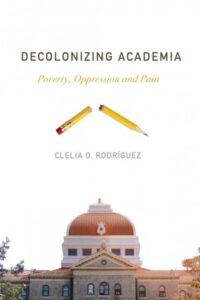Next week, we’d like to have your reflections engage closely with the texts, perhaps using a single word or sentence as your starting point.
Here are the readings again:
- Clelia O. Rodríguez, Decolonizing Academia (ch1, ch4)
- Smith, Tuck, & Yang, Indigenous and Decolonizing Studies in Education (Intro to the series; Sandra Styres, “Literacies of Land”; Wilson and Laing, “Queering Indigenous Education“)
One possible point of entry is the word “decolonizing” itself. How do the various authors of this week’s texts use the term? Consider a few examples:
- “[D]ecolonization from settler colonialism in the US will require a repatriation of Indigenous land and abolition of slavery in all its forms” (Tuck and Yang xii)
- “Decolonizing studies, when most centered in Indigenous philosophy, push back against assumptions about the linearity of history and the future, against teleological narratives of human development, and argue for renderings of time and place that exceed coloniality and conquest” (Tuck and Yang xiii)
- “Decolonizing requires developing a critical consciousness about the realities of oppression and social iniquities for minoritized peoples. [. . .] We, all of us, must develop a critical discourse that explores the ways colonial relations are and continue to be perpetuated and maintained through relations of power and privilege.” (Styres 32)
- “I do not know if decolonization is possible and it feels like the term has become a catchphrase. I see decolonization stickers on people’s computers and there’s an irony in that—a sign that our movement has been branded.” (Wilson and Laing, 136)
- “There we have it. The politics of decolonization is not he same as the act of decolonizing. [. . .] I am concerned about how the terminology has started to evoke a practice of getting rid of colonial and imperialistic practices by the very same people who are not only operating fully under those practices but who also receive full financial benefit from them. Decolonizing and capitalism seem to be attached in a sticky situation[.]” (Rodríguez 11)
Another approach you might take to this week’s readings is to  consider form, particularly in Clelia Rodríguez’s work. You might think about questions such as:
consider form, particularly in Clelia Rodríguez’s work. You might think about questions such as:
- Why might Rodríguez make the structural/style choices that we see in the reading?
- What are the effects on you, as a reader and as a person moving through academic spaces?
- What do you make of these formal choices in conjunction with the images on the book’s cover (below)?
- Does this reflection on form bring up any new thoughts for you regarding your final project?


